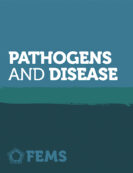FEMS Microbiology Letters Poster Prize: Jess Palmer & Tessa Reid
Molecular Microbial Ecology Group Meeting 2019
FEMS Microbiology Letters awarded two presentation prizes at the Molecular Microbial Ecology Group Meeting 2019, which took place at The Open University, Milton Keynes (UK) on 5-6 December 2019. Congratulations to Jess Palmer from the University of Warwick (UK), awarded the Poster Prize for her poster The degradation of para-nitrophenol (PNP) by phyllosphere microbiota, and to Tessa Reid for her poster The effect of chemical fertiliser on plant growth-promoting rhizobacteria in wheat.
Jess Palmer
What is your current position and what was your scientific journey to get there?

I recently began my first post-doctoral research position at the University of Warwick, where I am currently investigating the oxidation of the trace gas DMS by marine microbiota and whether this process is regulated by the presence of methylated amines.
I have been intrigued by microbiology since school and during my medical microbiology undergraduate degree at the University of Warwick, my interests shifted specifically to environmental microbiology when I completed my undergraduate project on the specificity of freshwater cyanophages. I then chose projects in related fields and completed a summer URSS project on the degradation of isopyrazam by river bacteria and my mbio project which investigated the taxonomic and functional diversity of the tree phyllosphere. I thoroughly enjoyed my mbio project and therefore continued this work as part of my NERC-CENTA funded PhD on the degradation of atmospheric pollutants by phyllosphere microbiota.”
Could you describe the research your poster covered?
Bacteria on the leaf surface have very few sources of carbon and energy available to them and therefore some bacteria have adapted to utilise atmospheric volatile organic compounds, many of which are considered air pollutants. My poster presentation displayed how phyllosphere microbiota are capable of degrading para-nitrophenol (PNP), an atmospheric pollutant primarily released into the air by anthropogenic combustion processes.
Monitoring of PNP degradation rates in PNP enrichment cultures where tree phyllosphere samples were used as an inoculum indicated that the microbial community present on an evergreen tree species degraded PNP more rapidly than that of a deciduous tree species. From use of both cultivation techniques and next generation sequencing, bacterial species able to degrade PNP, or likely PNP degraders were also identified, including species of Pseudomonas, Cabelleronia and Rhodococcus.
Overall, these results indicated that PNP may be a widespread function of the phyllosphere of trees and that phyllosphere microbiota may be capable of a wide range of other atmospheric pollutants.”
What do you hope to focus your research on in the future?
For the next two years, I will be focussing on my post-doctoral project which investigates methylamine-dependent co-oxidation of DMS, an environmentally relevant trace gas involved in cloud albedo, by marine bacterial communities. I am enjoying this research and believe that understanding the impact microorganisms currently have on environmental processes, or could have in the future, is extremely important. I would therefore love to continue working in the field of environmental microbiology throughout my career.”
Tessa Reid

What is your current position and what was your scientific journey to get there?
I am a PhD student at Rothamsted Research and part of the Environment and Agrifood PhD programme at Cranfield University. My research focuses on the impact of agricultural domestication on the soil microbiome of wheat, with the goal of reducing the dependency of commercial wheat on environmentally harmful chemical fertilisers.
From my childhood years spent fascinating over plants in the garden to a Biology degree at the University of Exeter, my scientific journey so far has been an intensive and gratifying adventure. After my undergraduate degree, I spent two years as a post-graduate researcher in the Exeter Microbial Biofuels Group, with a one-year industrial placement at the Shell Technology Centre in Houston, Texas. I worked in Shell’s Biodomain team with the aim of assessing the potential of different microbial routes to advanced biofuels from lignocellulose.
After seeing the power and potential that microbes can have in industry, I wanted to learn more about microbial application in sustainable agriculture, one of the world’s greatest future challenges. So when it came to a PhD, I had no hesitation in choosing Rothamsted – a world-renowned agricultural research institute in my beautiful home county of Hertfordshire.”
Could you describe the research your poster covered?
The poster presents results from the initial experiment of my PhD, investigating the effect chemical fertiliser has on the presence and selection of plant growth-promoting rhizobacteria in wheat. By applying culture-dependent techniques, I’ve been able to show that fertiliser addition decreases the abundance of plant growth-promoting rhizobacteria isolated from the wheat root microbiome.
We believe that genetic changes during the domestication of wheat has contributed to an increased dependency on fertiliser and decreased the ability of the crop to select for beneficial rhizobacteria. My PhD aims to investigate the extent of this by applying similar techniques to ancestral and commercial wheat varieties.
This work would not have been possible without the collaboration between Rothamsted Research and Cranfield University.”
What do you hope to focus your research on in the future?
First and foremost, from an evolutionary perspective I hope to find an answer to the question ‘Has agriculture domestication decoupled beneficial plant-microbe interactions in wheat?’. Plant breeding and soil microbiology have been well researched as individual fields however, the relationship between the two has been less well characterised.
Additionally, plant growth-promoting rhizobacteria hold huge potential in the sustainable intensification of agriculture. In the future, I hope to explore the use of rhizobacteria as biofertilisers to support sustainable agriculture, with a reduced dependency on chemical fertilisers.”
All but one of the FEMS journals are fully open access (OA), with one journal, FEMS Microbiology Letters, offering free-to-publish and OA options. Open access is key to supporting the FEMS mission of disseminating high quality research as widely as possible: when high quality, peer reviewed sound science is open access, anyone, anywhere in the world with an internet connection, can read it.







